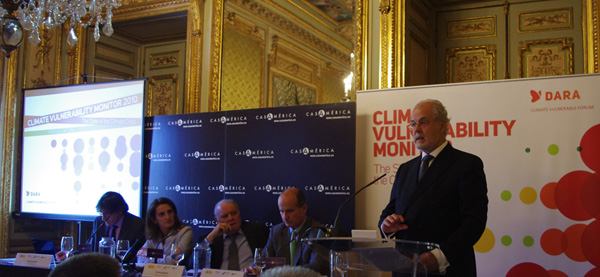September 29, 2011

Arturo Larena, Teresa Ribera, Enrique Iglesias, José María Figueres and Michael Zammit Cutajar at the Monitor Presentation in Madrid, 29 September 2011
DARA is very excited to report that the presentation of the “Climate Vulnerability Monitor” in Madrid, September 29, was a monumental success. The Spanish Ministry of Environment, EFEverde, Iberoamerican Secretary General, and DARA all shared the results of the “Climate Vulnerability Monitor: The State of the Climate Crisis”, and the “Climate Vulnerability Forum (CVF)”. They also outlined the need for greater national involvement, especially by wealthy, industrialized countries, pointing out that they, too, are not immune to the effects of climate change, and that, in fact, Spain and the United States are the most vulnerable among developed countries.
The presentation focused on DARA work at the convergence of climate, humanitarian assistance, and sustainable development, while giving praise to the efforts of the Spanish Secretariat of State on Climate Change, and Agencia Española de Cooperación Internacional para el Desarrollo (AECID), for their vision and commitment to supporting efforts to tackle climate change on the group. Delegates also confronted climate skepticism, by calling attention to research and simple facts that back the consensus on the reality, causes and basic consequences of climate change.
Presentation Summary
Introductions were made by José María Figueres, former President of Costa Rica and DARA Board Member, Enrique Iglesias, Iberoamerican Secretary General, and Arturo Larena, Director of EFEverde. Teresa Ribera, the Spanish Secretary of State for Climate Change, outlined the importance of the Monitor as vital tool in identifying and assessing the impacts of climate change, and explained Spain´s position within the climate change framework. The key findings of the Monitor were presented by Michael Zammit Cutajar, former Executive Secretary of the United Nations Framework Convention on Climate Change (UNFCCC).

Teresa Ribera
Individual Insights
Michael Zammit Cutajar emphasized the gap between the magnitude of the problem and national and multilateral responses. He highlighted the need for better understanding of climate change impacts, and their subsequent integration into national policies, plans for development, and humanitarian assistance, stating that “the world needs to be more ambitious in mitigation, and [that] the US needs to lead.”
José María Figueres added that the Monitor provides a useful guide book for the international community to accurately measure and quantify the effects of climate change, and provide for effective adaptation measures. He spoke optimistically, stressing that “the environment must be seen as an opportunity for employment, and not as a threat.”
Enrique Iglesias emphasized the key role of the public in encouraging governments to develop short and long-term plans for combating the effects of climate change, and heightening their awareness of the climate crisis. The closing message he gave the audience demanded action: “adaptation requires long-term political commitment, now!”
Teresa Ribera pointed out that addressing the climate change challenge will require collective responsibility and a high level of solidarity. In the same spirit, she stated that “there are no losers and winners when it comes to climate change, but only losers and greater losers.”
Take Home Message
The presentation had an overall positive message: tackling climate change is easy, and also the most sensible way forward. Two strong recommendations to accelerate the resolution of the climate change crisis were also provided: increasing Spain’s official involvement and role as a European, and global leader of the fight against climate change, and expanding the low-carbon sector in vulnerable countries.
In light of Spain´s natural renewable energy advantages, any ambitious national policy changes will have tremendous comparative benefits for Spain, and will serve to educate and compel other nations to follow suit.
The necessary emission reductions via low-carbon sector expansion will need to be shared by developed and developing nations alike. This will postpone the now imminent “D-day” until more permanent solutions are reached, while also reducing mortality and respiratory disease rates in vulnerable countries.
DARA’s Call To Action
For these, and many other reasons, DARA is supporting the “Climate Vulnerable Forum (CVF)”. It is an action-orientated group of vulnerable developing countries, led by Maldives, Kiribati, Bangladesh and others. Their ministerial meeting, scheduled for October 14th-15th, 2011, in Dhaka, Bangladesh, will be an important step forward for vulnerable countries and the world. Be sure to continue to visit our blog, website, and Facebook page to obtain more information on this very important event.
Share this